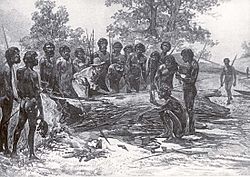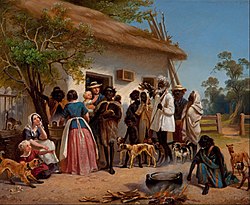The Europeans who came to Australia already had ideas and theories about Indigenous peoples and these often clouded their ability to understand the peoples they met.

Wurundjeri people at the signing of Batman’s Treaty, 1835
In 1770 Captain James Cook landed in Botany Bay, home of the Eora people, and claimed possession of the East Coast of Australia for Britain. According to European international law at the time, there were only three ways that Britain could take possession of another territory:
- If it was uninhabited the territory could be claimed and settled.
- If the territory was already inhabited, permission could be sought from the inhabitants to use or purchase some of their land.
- If the territory was already inhabited, Britain could take over by invasion and conquest. But the original inhabitants would still have rights after such a war of conquest.
Britain did not follow any of these processes in Australia. They did not formally declare war. And although they were well aware that Australia was inhabited, the British Government ignored this fact and proceeded as though it were settling an empty land. They did so on the newly developed belief that land occupied by ‘hunter gatherer’ societies could be deemed to be ownerless. The legality of this action, even according to European internal law at the time, was questionable. Later, in the nineteenth century, this action was justified with the development of the legal concept of terra nullius (Borsch, 2001).
The British set sail from England at a time when ideas of ‘the noble savage’ were in circulation. The idea of the noble savage was about people who were found to be living in a natural state, untouched by the corruption and degeneration brought about by industrialization, urbanization and ‘progress’. Explorers could travel the world looking for these ‘untouched’ people who lived as nature, and god, intended. They would live simply off the land, their tools and implements might be unsophisticated but they would have a natural grace and dignity which would set them apart from Europeans. Noble savage imagery often included a critique of European society.
The writings of Captain James Cook can be seen to be influenced by this idea:
| “
|
From what I have said of the Natives of New Holland they may appear to some to be the most wretched People upon Earth; but in reality they are far more happier than we Europeans, being wholy unacquainted not only with the Superfluous, but with the necessary Conveniences so much sought after in Europe; they are happy in not knowing the use of them. They live in a Tranquility which is not disturbed by the Inequality of Condition. The earth and Sea of their own accord furnishes them with all things necessary for Life. They covet not Magnificient Houses, Household-stuff, etc.; they live in a Warm and fine Climate, and enjoy every wholesome Air, so that they have very little need of Cloathing; and this they seem to be fully sencible of, for many to whom we gave Cloth, etc., left it carelessly upon the Sea beach and in the Woods, as a thing they had no manner of use for; in short, they seem’d to set no Value upon anything we gave them, nor would they ever part with anything of their own for any one Article we could offer them. This, in my opinion, Argues that they think themselves provided with all the necessarys of Life, and that they have no Superfluities. (Wharton, 1893, Chapter 8, Australian Natives).
|
”
|

European settlers with Aborigines, South Australia, 1850
Cook’s journals were edited and changed before they were originally published, and the idea that Aboriginal people were happier than Europeans was removed.
The change was more in keeping with the other idea about human difference that was popular at the time, and it was far less romantic and positive. The ‘stadial’ or ‘four stages’ theory of history suggested that human societies progressed in four distinct phases. Human development was thought to start from the point where people would live in a so-called “state of nature”, with little or no human society, hunting and gathering for their food. As societies developed, they passed through stages of being pastoralists, tending for herds of animals, then to agriculture, and finally trade based societies, leading to a pinnacle of human development in the societies of Europe. As economic arrangements and forms of livelihood developed, so too did political arrangements, cultural and artistic pursuits (Williams & Marshall, 1982).
This more negative view meant that when other Europeans met with or read about Aboriginal people they did not necessarily have such positive views as Captain Cook had. They might instead see Aboriginal people as without agriculture, and hence without any system of government, and living a so-called “primitive” life. This negative view of Indigenous people tended to be more common, but as Captain Cook’s writing shows, it was not the only way to see things.
Key Idea
The Europeans who came to Australia already had ideas and theories about Indigenous peoples and these often clouded their ability to understand the peoples they met.
In 1770 Captain James Cook landed in Botany Bay, home of the Eora people, and claimed possession of the East Coast of Australia for Britain. According to European international law at the time, there were only three ways that Britain could take possession of another territory:
Britain did not follow any of these processes in Australia. They did not formally declare war. And although they were well aware that Australia was inhabited, the British Government ignored this fact and proceeded as though it were settling an empty land. They did so on the newly developed belief that land occupied by ‘hunter gatherer’ societies could be deemed to be ownerless. The legality of this action, even according to European internal law at the time, was questionable. Later, in the nineteenth century, this action was justified with the development of the legal concept of terra nullius (Borsch, 2001).
The British set sail from England at a time when ideas of ‘the noble savage’ were in circulation. The idea of the noble savage was about people who were found to be living in a natural state, untouched by the corruption and degeneration brought about by industrialization, urbanization and ‘progress’. Explorers could travel the world looking for these ‘untouched’ people who lived as nature, and god, intended. They would live simply off the land, their tools and implements might be unsophisticated but they would have a natural grace and dignity which would set them apart from Europeans. Noble savage imagery often included a critique of European society.
The writings of Captain James Cook can be seen to be influenced by this idea:
Cook’s journals were edited and changed before they were originally published, and the idea that Aboriginal people were happier than Europeans was removed.
The change was more in keeping with the other idea about human difference that was popular at the time, and it was far less romantic and positive. The ‘stadial’ or ‘four stages’ theory of history suggested that human societies progressed in four distinct phases. Human development was thought to start from the point where people would live in a so-called “state of nature”, with little or no human society, hunting and gathering for their food. As societies developed, they passed through stages of being pastoralists, tending for herds of animals, then to agriculture, and finally trade based societies, leading to a pinnacle of human development in the societies of Europe. As economic arrangements and forms of livelihood developed, so too did political arrangements, cultural and artistic pursuits (Williams & Marshall, 1982).
This more negative view meant that when other Europeans met with or read about Aboriginal people they did not necessarily have such positive views as Captain Cook had. They might instead see Aboriginal people as without agriculture, and hence without any system of government, and living a so-called “primitive” life. This negative view of Indigenous people tended to be more common, but as Captain Cook’s writing shows, it was not the only way to see things.
Content is available under the
Creative Commons Attribution Share Alike License.
Privacy Policy | Authors